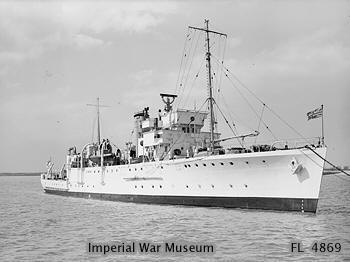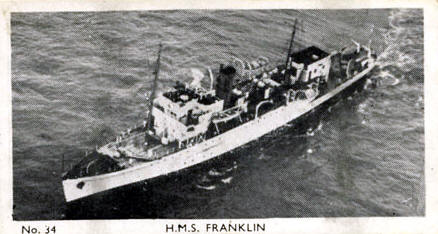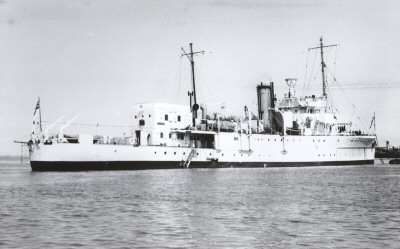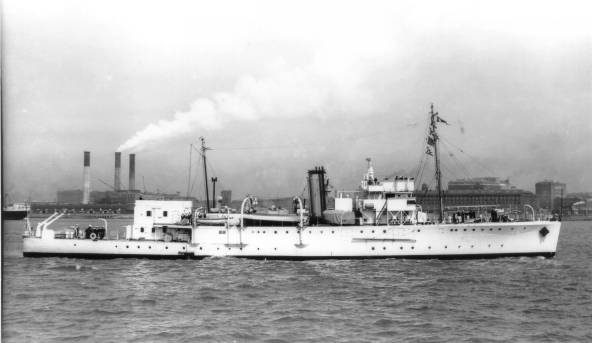











|
|

HMS Franklin (IWM FL4869)
|
Principal Surveys |
|
|
1946 |
England, East Coast. |
Thames Estuary. Trials
with new Decca navigator.
Commander: R T Tripp |
|
14.1.46 |
|
Steward Manfred Revell Ternent C/LX 22106 died |
|
7.9.46 |
|
Stoker 1st Class George Harwood Woodcock C/KX79345 died
aged 39. |
|
1947 |
England, East Coast. |
Thames Estuary; Goodwin
Sands; Harwich Harbour. Wreck sweeping. Commander: R T Tripp |
|
1948 |
England, East Coast. |
River Medway. Reduced
complement due to Navy-wide manpower shortages. Commander: R H Connell |
|
|
|
The following season
(1948) we spent most of the time tied up in Chatham Dockyard or moored
in Short Reach as the work was done by the ships boats. The survey
area was from Rochester Bridge to Sheerness Light and included work in
the Dockyard basins. The two motor cutters, Stork and Penguin,
carried out the river work and the 12ft motor dinghy, Spider, carried
out the dock work. We also had a skimming dish which was later
replaced by a second 12ft motor dinghy named the Fly.
During this period I
was loaned to the General Stores to help with a stores muster as a
new Supply Officer had been appointed to the ship. This led to the
'Fisgig' incident. In the Permanent Rate Book there was an item -
Fisgigs, 1 in No.
I asked what
it was so that I could initial the book to indicate that it was
present. No-one seemed to know including several senior Petty
Officers and the Survey Officers had no idea either. Eventually the
Coxswain suggested that I ask a elderly Able Seaman, Georgie Bates.
I located George tucked away in his 'caboose' and asked him what a
Fisgig was. His reply was, 'Look for something like Daddy Neptune's
trident'. 'What's it for?', I asked. 'It's a fish spear', was the
reply. I found it propped up behind the stores desk. It had five
prongs, the outer pairs could be unscrewed to give a single or a
three pronged spear. Apparently as a single pronged spear it could
be thrown or used as a gaff. With the extra prongs the technique
was to feel along the bottom in shallow water to disturb flat fish
and they could be caught by one or more of the prongs. Regrettably
I never got the opportunity to see the spear in action.
Ken
Sheale |
|
1949 |
England, East Coast |
Thames estuary and
approaches. Commander: R H Connell |
|
1950 |
England, East Coast |
Thames estuary.
Commander: C R K Roe |
|
1951 |
Scotland, West Coast
England, East Coast.
Ireland, North Coast. |
Oban
and approaches; N.W. Coast of Mull; The Small Isles.
Thames Estuary.
Lough Foyle.
Commanders: C R K Roe, N
D Royds |
|
1952 |
England, East Coast.
Scotland, West Coast |
Thames Estuary.
Loch Striven; Loch Linnhe.
Commander: G P D Hall
Paid Off Jan 1953 |

Being a survey ship, we had on board two motor boats (Stork&
Penguin) that were used to take different readings of tides and
such from the islands dotted about at sea. It was the stokers
job to look after the engines fuel/fresh water before each trip
was taken but on this occasion he forgot the fuel and took only
fresh water. As you can imaging it wasn't long before the
coxswain radioed that they had run out of fuel and were drifting
and needed help. The officer of the watch decided that has it
was a stokers fault and that the off watch stokers should man
the whaler and go and tow it back. It wasn't a pretty sight but
must have been good viewing as an officer used his movie camera
to record it.
Another time we were asked to
look out for a ditched pilot that had been sighted ,I wont go
into details of his condition when we found him but the only way
we could get him on board was to lower a stretcher under him.
When we got back to the Franklin the doc got us issued with a
tot of rum.
Bob Larkman HMS Franklin October 1949 - 1951
|

HMS Franklin April 1950
(www.battleships-cruisers.co.uk)
|
1953 |
January |
Paid off into Reserve. |
|
1956 |
February |
Sold to
BISCO. Broken up by Clayton
and Davie, Dunston on Tyne, Gateshead. |

HMS Franklin Liverpool, Nov 1951
|

